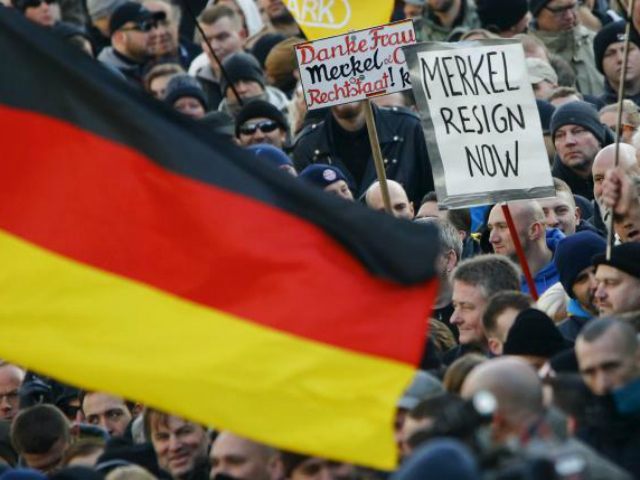The combination of the German economy plunging after the “Brexit” in June, and the terrorist attack last week by the son of Iranian immigrants screaming “Allahu Akbar” as he slaughtered 9 people in Munich, may signal the tipping point that dooms the European Union.
Virtually unreported in the American press, the German “ZEW Economic Sentiment Indicator,” which tracks the economic projections of Germany’s top 350 economists and analysts for the next six months, collapsed from a booming +19.2 in mid-June, before the Brexit, to a deep recessionary expectation of ‐6.8 on July 20.
The “ZEW” sentiment is now at the lowest level since November 2012, at the depth of the European debt crisis. Facing looming sovereign defaults and widespread bank runs at the time, Germany was forced to underwrite a massive bailout of several European Union member states, including Greece, Portugal, Ireland, Spain and Cyprus.
Germany’s motivation for funding the wildly expensive rescue was to keep immigration from flowing into the nation experiencing what economists call a “demographic bomb.” Projections are that by 2030, Germany’s working-age population will shrink by 6.3 million. By 2060, the overall German population will have plunged from 82 to 65 million.
German companies warning of a looming shortage of skilled workers, supposedly already costing the economy $27 billion a year, successfully lobbied the government to triple annual immigration from 2013 through 2015.
Despite only 737,630 births and 925,239 deaths, Germany’s population grew in 2015 by importing 1.1 million refugees. As a result of government policies, Germany’s immigrant population has reached about 17.5 million, and immigrants now account for 22 percent of the nation’s total population.
Germany’s Federal Service for Migration and Refugees recently reported that for 2015, about three-quarters of refugees who entered Germany were males, two-thirds were younger than 33-years old, few had any working experience, and most came from across war-torn parts of the Middle East and Africa.
During the three-year period from 2013 to 2015, the German government celebrated the influx of immigrants as the key to the German economy growing by at about 2 percent a year, one of the highest growth rates in the EU.
But in the third major act of violence against civilians in Western Europe in eight days, 18-year-old German-Iranian Ali David Ali Sonboly appears to have used a fake Facebook account to lure young people to a McDonald’s restaurant with the a promise of free food on June 22, before starting a shooting rampage.
The terrorist’s bloody shooting spree spread to a local shopping center and to the streets around Munich’s Olympic Shopping Center. By the time he committed suicide, the gunman had killed 9 and sent 27 people to the hospital, three of whom were critically wounded, according to Munich Police President Hubertus Andrae.
Germany was already on heightened alert following a July 19 attack near the Bavarian town of Treuchtlingen, in which a 17-year-old Afghan refugee screaming “Allahu Akbar” and wielding an axe was able to wound three people and injure another before being shot dead by police.
Germans are becoming increasingly skeptical of mass immigration, with large numbers refusing to approve of their country accepting refugees and a record number putting national identity before referring to themselves as “global citizens.”
According to a survey by GlobeScan for BBC World Service, over 60 percent of Germans felt more like “global citizens” than citizens of Germany in 2002. But just before the latest attacks, only 30 per cent of Germans feel like “global citizens,” and 57 percent feel more like “Germans.”
With Germany’s economy set to flounder and immigrants now perceived by “Germans” as the main threat to public safety, German politicians will be highly reluctant to continue funding the bailouts that are holding the European Union together.

COMMENTS
Please let us know if you're having issues with commenting.